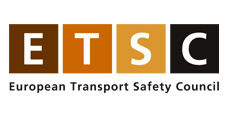Declines in the level of police enforcement of traffic offences are contributing to Europe’s failure to cut the numbers dying in road collisions, according to a new report by the European Transport Safety Council. In over half the countries where data is available, the number of tickets issued over the last five years for use of a mobile phone while driving has reduced, suggesting lower levels of enforcement across Europe.
Antonio Avenoso, Executive Director of the European Transport Safety Council said:
“Cuts to police enforcement are doubly damaging. Fewer dangerous drivers are caught, and overall perception of the risk of being caught also decreases. While there is increasing pressure to reprioritise policing budgets across Europe, it makes no sense to cut back on road safety. 26,000 are still dying each year on our roads, and the numbers will not start to decrease again without concerted action.”
Sweden, The Netherlands and Finland are among countries that have reported falls in speeding tickets issued. These countries have also seen some of the biggest slow-downs in reducing road deaths since 2010. In the UK, where deaths have also been slow to reduce, the number of tickets issued fell after 2010 when government cuts affected enforcement levels but tickets issued are starting to increase again. In Germany, another country with a slowly-reducing death rate, there is no national data available on tickets issued, depriving policy makers of essential information on the effectiveness of measures to reduce speeding.
On drink driving, half of the countries that provided data showed a decrease in the number of enforcement checks since 2010, and half showed an increase. The number of alcohol road-side checks grew by 39% each year in Poland, 24% in Estonia and 12% in Portugal. The number of alcohol checks dropped by 13% annually in Sweden, 10% in Cyprus and 5% in England and Wales. It is estimated that up to 2% of distance travelled in the EU is driven with an illegal Blood Alcohol Concentration but a quarter of all road deaths in the EU are alcohol related.
David Davies, Executive Director of PACTS, the UK’s Parliamentary Advisory Council for Transport Safety, said:
“This report from ETSC shows the importance of adequate levels of enforcement to maintain road safety. It adds to the recent report from the Transport Select Committee which called for a strengthening of road policing, something widely supported by the public.
“The Europe-wide comparison of traffic law enforcement activity suggests that the UK motorist is not unreasonably penalised as some would suggest. It is worrying that the amount of breath-testing carried out by the police in England and Wales is not only low by European standards but has declined since 2010, despite no reduction in drink drive deaths. It is regrettable that data for breath tests and speeding offences are not available for Scotland.”
Notes
- The ETSC PIN Flash report “How traffic law enforcement can contribute to safer roads” can be downloaded from http://etsc.eu/wp-content/uploads/PIN_FLASH31_final.pdf
- Note on methodology: The enforcement report uses the number of speeding tickets, road-side alcohol breath tests, tickets for non-use of seat belt and tickets for illegal use of a mobile phone per head of population as an indicator, assuming that they are broadly proportionate to the level of enforcement activity. The ideal indicator on how to assess the level of enforcement of speeding would be to compare countries on the basis of time spent on speed enforcement or checks performed both by the police and by safety camera but this information is not available in most countries.

